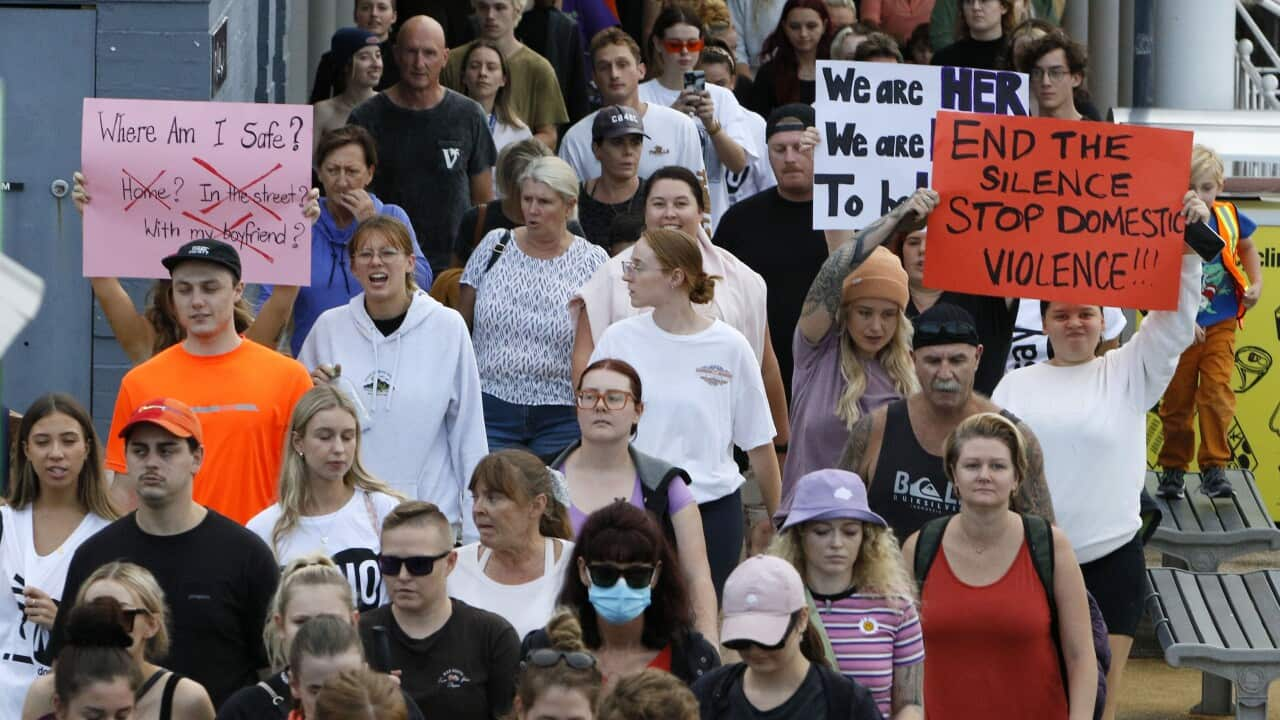This story contains references to domestic, family and sexual violence, and suicide.
Acting tough, even in moments of fear or sadness.
Being 'self-sufficient' and avoiding showing emotions or asking for help.
Being the breadwinner and not being responsible for household chores.
Being in control and using violence to earn respect.
These perceptions and beliefs fall into a rigid set of norms that are said to place pressure on men to be or act in a certain way.
Known as the 'Man Box', new research has found that almost one in four Australian men aged 18 to 45 (24 per cent) personally believe in these 'rules', while more than one-third (36 per cent) feel social pressure to conform to them.
This can have harmful consequences.

New research has found that one in four Australian men believe in rigid ideals of masculinity, while more than one in three feel pressure to conform to them. Source: SBS News
"These Man Box pressures tell men to be tough, fight back, never say no to sex and avoid household chores. They box men in and limit their potential," said Matt Tyler, executive director of Community and Systems Impact at JSS.
"Our research finds that when men believe these rules, the results can be devastating for people in their lives, particularly women, as well as for men themselves."
This study is modelled on another used by a US-based not-for-profit organisation, Equimundo, which has conducted research across more than 30 countries.
What is the 'Man Box'?
Tyler said the Man Box concept is made up of "19 rules that characterise stereotypical ideals related to masculinity".
These include statements such as "a guy who doesn’t fight back when others push him around is weak" and "men should use violence to get respect if necessary".
Michael Flood, a researcher at the Queensland University of Technology who contributed to the report, said there have been decades of research into the norms or social expectations that shape the lives of men and boys, and the lives of those around them.
"Masculinity is a term for whatever sets of social expectations are most dominant in a particular context. When we think about the Man Box, it names one version of masculinity based on those qualities of being tough, aggressive, stoic, emotionally inexpressive and dominant," he said.
What has the 'Man Box' study shown?
JSS has been examining attitudes around what it means to be a "real man" since 2018.
The Man Box 2024 is the largest Australian study of its kind.
Researchers surveyed more than 3,500 men aged between 18 and 45 across the country using an online survey and focus groups.
On average, the study found that 36 per cent of men felt social pressure to follow the 'Man Box' rules, the strongest being "acting tough", which was agreed to by 50 per cent of those aged 18 to 30.
An average of almost one in four men (24 per cent) personally agreed with the rules. That means around three in four men rejected them.
The study's authors said there is both good and bad news in the findings.
While a model of manhood based on toughness, aggression and male dominance is not the "cultural standard" in Australia, it is endorsed by a "sizeable minority" of mainly young men.
'Concerning' link to violence, hostility towards women
In "stark" and "concerning" findings, the study found those who most strongly agreed with 'Man Box' rules were more likely to hold violence-supportive attitudes and to have used violence in their intimate relationships — particularly against women.
When compared with those who least agreed, these men were 35 times more likely to have frequently sexually harassed a woman or girl verbally in a public place, and 11 times more likely to have frequently perpetrated verbal, online or physical bullying.
They were eight times more likely to have perpetrated sexual violence against an intimate partner — including 28 times more likely to have used fear to coerce a partner into having sex — and five times more likely to have been physically violent.
They were 17 times more likely to hold violence-supportive attitudes, and five times more likely to disbelieve experiences of gender inequality.

The Man Box 2024 found those who most strongly agreed with rigid ideals were more likely to have engaged in violence and hostility towards women, and have poor health outcomes themselves. Source: SBS News
Kate Fitz-Gibbon, chair of Respect Victoria — which supported the study — said the findings show a direct correlation between harmful stereotypes and the perpetration of violence.
"We know that to prevent violence against women, we have to deeply understand what drives it," she told SBS News. That includes gender inequality and a range of other factors.
"This report really reinforces that harmful societal ideas about what it means to be a man can drive violence against women — and that holding onto those outdated stereotypes about gender harms everyone."
"There's a really clear connection that tells us we absolutely have to tackle this."
'We need to shift the burden'
Phillip Ripper is the chief executive at No to Violence, the peak body for organisations that work with men who resort to family violence.
He told SBS News this study brings this correlation into "stark relief".
"Not all disrespect of women ends in family violence. But all family violence starts with disrespect for women," he said.
"The study focuses the issue where it needs to be, and that's with men and men’s masculinity.
"We need to shift the burden."
Fitz-Gibbon said the latest research shows a “promising shift” in the way men perceive some social pressures.
"As a community, we are moving in the right direction, but too slowly. We need to escalate our efforts," she said.
But Flood is concerned there hasn't been a noticeable shift in male norms of aggression or the use of violence.
"Norms that 'boys will be boys' don’t seem to have changed much in Australia. We've seen more shifts in young men's sense of the norms around men's health and help-seeking and less change in the norms around male violence."
'The Man Box is not going away'
Tyler said the research can be used to raise awareness of the harms of the 'Man Box' and promote alternatives "before the point of crisis".
“These attitudes really matter,” he said, adding the crux of the issue is a need for connection and belonging.
"We have to create alternative ways for men and boys to construct their identity in a way that isn't attached to these really harmful manifestations of masculinity."

Experts say preventing violence against women comes from deeply understanding what drives it, including harmful ideas about what it means to be a man. Source: Getty / In Pictures Ltd/Corbis
Flood agreed that we need to "scale up" work in this space.
In October 2023, the Albanese government announced a $3.5 million trial over three years to help combat harmful gender stereotypes targeting young men and boys online and explore ways to encourage healthy masculinities.
In a statement to SBS News, Minister for Social Services Amanda Rishworth said she welcomes new research that can inform policy responses ending violence against women in one generation.
"The existing research shows there are strong links between harmful forms of masculinity and the perpetration of violence against women.
"That's why we are already investing in a variety of different pilots and activities under the First Action Plan of the National Plan to End Violence Against Women and Children 2022-2032," she said.
"Educating boys about healthy, respectful relationships with their peers and themselves and providing them with positive role models are important steps to ending cycles of violence."
"The Man Box is not going away," Flood said.
"If all that we fund and support is a small number of programs among boys and men in schools, we're not going to make the kind of culture change which is necessary to shift the entrenched, pervasive cultural norms."
Ripper said the onus should also be on men to "stand up".
"It's about men intervening — not being passive bystanders, but taking a role in their families, workplaces, social groups and sporting settings to call out attitudes that are disrespectful towards women," he said.
"By challenging that pressure, we're giving men the chance to reflect, change and express their own individuality freer from these rigid gender stereotypes."
If you or someone you know is impacted by family and domestic violence, call 1800RESPECT on 1800 737 732 or visit . In an emergency, call 000.
The Men's Referral Service provides advice for men on domestic violence and can be contacted on 1300 766 491.
Readers seeking crisis support can contact Lifeline on 13 11 14, the Suicide Call Back Service on 1300 659 467 and Kids Helpline on 1800 55 1800 (for young people aged up to 25). More information and support with mental health is available at and on 1300 22 4636.
supports people from culturally and linguistically diverse backgrounds.














